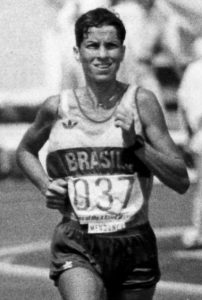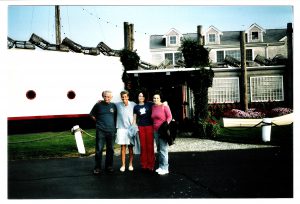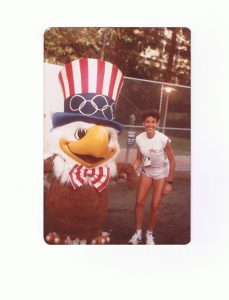August 2, 2016, by Guest Author
My part in Rio 2016…from my desk in Nottingham
There are 5185 miles that separate Rio de Janeiro and Nottingham but I can already feel the excitement building ahead of the Olympics. This is because in my small way I have helped bring recognition to a deserving athlete and fellow Brazilian.
Imagine waking up one morning with the certainty that you would be a part of something historic in the hours to come. That is what happened to Eleonora Mendonça who ran the first women’s Olympic marathon in Los Angeles on August 5th, 1984.
Now, almost precisely 32 years later, she will be carrying the Olympic torch in Rio de Janeiro, her hometown, in (a very small) part, thanks to my nomination.
Running an Olympic marathon is a remarkable feat on its own, but Eleonora was also a pioneer. At a time when women’s sports were fraught with prejudice, she was part of the lobbying effort for the inclusion of longer distance running events for women in the Olympic Games.
In 1979, she was co-president of the International Runner’s Committee (IRC) one of the organizations that fought for parity for women in track and field. Since 1972, the 1,500m race was the longest event for women to compete in at the Olympic Games. Nine years later, in February 1981 the IRC added the women’s 3,000 meters and marathon events to the 1984 Olympic program.
However, Eleonora still had to fight to represent Brazil in this historic race. Despite the fact that she won the Brazilian Olympic marathon trials in Rio de Janeiro, the Brazilian Track and Field Federation refused to submit her name to the Olympic roster. Determined to succeed, Eleonora took the matter to the Brazilian courts of justice and she was eventually allowed to represent her country in the 1984 Los Angeles Olympic Games.
She became the first Brazilian female Olympic marathon runner when, age 35, she completed this historic race in 2h52:19, and in 44th place.
Although she is the only athlete to have held Brazilian records in 10 distances (from 1,500 meters to Marathon), I nominated Eleonora to carry the Olympic torch not only because of her amazing running career, but because she fought for the inclusion of women in a place where they simply were not welcome.
In a very distant way, I can relate to that. As a mathematician, I know that some people unfortunately still resist the idea of women being successful in STEM in general. We desperately need strong women role models like Eleonora, and I am anxiously waiting to see her carrying the torch, even if from a distance.
Andrea Genovese de Oliveira is a Phd student in Applied Mathematics at The University of Nottingham and originally from Brasilia, Brazil. She was the first person to nominate Eleonora, who is also a distant relative, to be a torch bearer. Eleonora was very excited when she told her about it.




Good report. Have known Elli since late 1970’s, we were both marathon runners meeting at races around the world. I was England’s rep. on the IRC . and organised the first women’s marathon in the UK in 1976. I stayed with Elli and her parents in Rio in 1980 and ran in some of the races Elli organised.
It will be so good to see her carrying the flag, a great honour for such an athlete and the hard work she has done for Brazlian athletics.